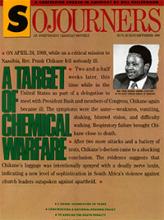The usual rap on TV cop shows is that they trivialize real life-and-death matters into a glossy package of sanitized violence designed to sell soap and soda pop. They give us a world where there are clearly identifiable bad guys around every corner, shootings happen two or three times an hour, and nobody bleeds too much. The result is a public that is either jaded to the point of cynical apathy or paralyzed with paranoia.
There's a lot of truth to that line of criticism. But in the case of the current outbreaks of drug-related violence, it's been the "serious" people in public office and the mainstream media who have trivialized the issues. They are the ones who treat a multibillion dollar international industry as if it were mostly a problem of dark-skinned teenagers shooting each other. They are the ones who offer over-simplified, falsely cathartic solutions like the death penalty.
Meanwhile, for the last five years, the only place in the popular media where you could intermittently find a serious and clear-eyed depiction of the drug problem was, of all things, on a TV cop show. The show was "Miami Vice," which aired its final episode in May.
I'm not claiming that "Miami Vice" was on the whole any kind of socially redeeming public service. It was mostly about loud noises, cool clothes, fast cars, and bad attitudes. I happen to enjoy all of those things. In fact, that's why I watched the show as often as I did. But in the course of depicting two vice cops, Crockett and Tubbs, in their Sisyphean trudge from car-chase to car-chase, "Miami Vice" also gave a depiction of the drug world, from its south Florida epicenter, in which the lines were never clear and the fix was always in.
Read the Full Article

